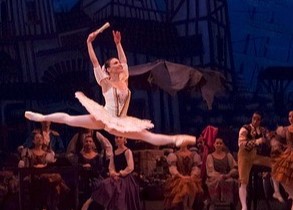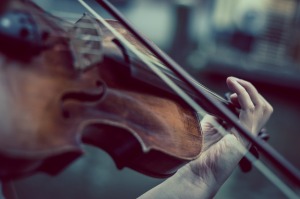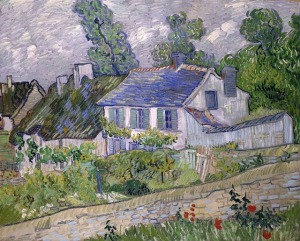Artists Starting The Day
 A novelist sits down at the computer to begin the day with an idea in mind, and a painter organizes her brushes before she begins. An actor is in a theater lobby trying to understand how she will play a complicated new role, and a ballet dancer is on a bus on his way to ten o’clock practice. He has worked so hard so long—since childhood—that his feet throb day and night.
A novelist sits down at the computer to begin the day with an idea in mind, and a painter organizes her brushes before she begins. An actor is in a theater lobby trying to understand how she will play a complicated new role, and a ballet dancer is on a bus on his way to ten o’clock practice. He has worked so hard so long—since childhood—that his feet throb day and night.
They might be anyone, but they’re not. They are artists and they are different and they know they are, and have always known. They have different points of view, habits, values, routines, and preoccupations than even the people closest to them, and as they perform their art today, carrying out their chosen roles, they will exercise talents that not everyone possesses. All the skills they’ve struggled to develop, and all the hopes and ambitions guiding them, and their entire being, will be brought to bear today.
To Be an Artist
Artists possess traits and qualities that equip them for the artist’s creative life. Whether you find them in big cities or remote jungles or on farms or in desert tents, in any of the four hemispheres, you will also find them generally to be quite similar: to have varied interests and to be persistent in the face of obstacles and disappointments. They are dogged, determined, resourceful, open-minded, undeviating, tolerant of ambiguity and novelty, tenacious, and tremendously independent and self-reliant. And they are also self-confident, resilient risk-takers with good memories, and the hardest workers on this globe and almost as self-sacrificing and self-demanding as Saint Francis of Assisi. They are complex thinking and feeling people who seek out complexity and who:
 Possess extraordinary energy and an addiction to work (A characteristic of artists that distinguish them from others is their capacity for hard sustained effort. No outstanding creative achievement has ever been produced without a great deal of conscious work on the part of the creator. When artists are fully functioning they work at white heat for an hour, a day, a week, or months or years.)
Possess extraordinary energy and an addiction to work (A characteristic of artists that distinguish them from others is their capacity for hard sustained effort. No outstanding creative achievement has ever been produced without a great deal of conscious work on the part of the creator. When artists are fully functioning they work at white heat for an hour, a day, a week, or months or years.)
Can produce tremendous volumes of work (Balzac wrote 95 novels before his death at 51. Picasso produced a quarter million works of art. Novelist Thomas Wolfe sometimes wrote 5,000 words in a night. Not always, but usually, the greatest artists are also the most prolific.)
Are willing to sacrifice for the sake of their art without hesitation (American Impressionist Mary Cassatt, possibly the greatest woman painter of the nineteenth century, kept royalty waiting until she had finished her day’s work. Hemingway said he had to ease off making love when he was writing hard because the two things were “run by the same motor.” Nobel Prize novelist Toni Morrison said, “The important thing is that I don’t do anything else.” Another Nobel novelist, Saul Bellow, said writing was more important to him than anything, including his family.)
Value authenticity, integrity, and sincerity (How many other occupations involve a quest for truth?)
 Are oriented to the fullest development of their skills (You must never lose the belief that you have the ability to carry out skills needed to produce quality art successfully. Developing skills leads to competency, then to expertise, then excellence, then greatness. If you feel you have the skills you are less likely to be haunted by self-doubt, and your art flows more freely. If you ask yourself “Do I have the skill?” and you answer “No I don’t,” you’ll have to learn the skill. There are any number of ways to accomplish that.)
Are oriented to the fullest development of their skills (You must never lose the belief that you have the ability to carry out skills needed to produce quality art successfully. Developing skills leads to competency, then to expertise, then excellence, then greatness. If you feel you have the skills you are less likely to be haunted by self-doubt, and your art flows more freely. If you ask yourself “Do I have the skill?” and you answer “No I don’t,” you’ll have to learn the skill. There are any number of ways to accomplish that.)
Are preoccupied with technique and style (The public isn’t meant to notice an artist’s technique, but other artists are aware of it immediately. The first thing you notice about a great artist is a distinctive style.)
Are ambitious and competitive (Art is as competitive as a Yankees-Red Sox game.)
Are resilient and able to overcome obstacles and persevere (Artists persist doggedly, however difficult or frustrating the physical and mental effort of pursuing their goal might be. After a success, your expectations of future success rise. When you see you are overcoming obstacles and making steady progress and reaching your goals, your confidence increases, sometimes phenomenally.)
Value originality (A work must be original if it’s to be considered artistic.)
Must have the ability to establish rapport with and hold an audience (To succeed, all works of art need a theatrical element.)
Must have a business sense (Artists have a career to manage, and responsibilities and expenses, and intangible rewards are not the only rewards. When you receive rewards your sense of well-being and hopefulness rise. All arts involve salesmanship.)
 Have a practical, problem-solving intelligence (Each day every artist on earth solves a hundred complex problems. Artists do not spend their days working on easy problems; they work on problems that are hard for them. That’s how they create work that has never been seen before and continue to expand their abilities at the same time.)
Have a practical, problem-solving intelligence (Each day every artist on earth solves a hundred complex problems. Artists do not spend their days working on easy problems; they work on problems that are hard for them. That’s how they create work that has never been seen before and continue to expand their abilities at the same time.)
Have an artistic vision and heightened perception (To the artist the world is inexhaustibly rich with aesthetic potential. To painters and photographers a leaf is much more than a leaf; an actor’s frown signifies more than a frown; a single word, a single syllable, holds untold riches for a poet.)
Have a capacity for self-criticism and objectivity about their work and their abilities (Artists learn to lay their egos aside as they would any other impediment.)
Are sensitive to life and open to experience (Curious, they plumb what is outside them in the world and their own thoughts, feelings, and emotions. Whatever happens to them, they never forget it.)
Strive for competence and constant improvement (An artist is never content very long.)
Value independence (All artists must be allowed to move in their own direction under their own power.)
Are more self-confident, rebellious, bold, and daring than the vast majority of people (If you lose those things, you lose your talent as well.)
Have the ability to focus (Artists are capable of ferocious concentration, losing all sense of time and place, conscious only of the work before them.)
Are playful and value the simple and the unaffected (Artists are in love with simplicity.)
Have an abundance of physical strength and stamina (Architect Buckminster Fuller was often unable to stop working until he dropped from exhaustion. Work poured out of Da Vinci in a torrent. Often it is the end of the artist’s endurance that stops his working day.)
Are far more self-disciplined in matters concerning work than most people in other fields
 Are able to adapt and make adjustments (An experienced artist has learned when to stop and begin again when something isn’t working.)
Are able to adapt and make adjustments (An experienced artist has learned when to stop and begin again when something isn’t working.)
Are studious in the sense of studying to develop their craft (All artists study and all are self-taught to a greater or lesser degree.)
Take luck, the breaks, and good or bad fortune into account (Good luck often follows persistence. A failure or wrong direction or bad luck may lead to something fruitful later on. A “wrong” word in a sentence may prove to be the perfect word.)
Must be patient, because all artists who reach high excellence will have done so via a long period of learning and application while pushing themselves upward to it.
Have a strong belief in, and respect and enthusiasm for their art
Are deep-feeling, emotionally rich
The writer at the computer, the painter sorting brushes, the actor in the lobby, and the dancer with sore feet needn’t feel lonely as they start the day because possibly very near are others who lead similar lives and are very much like them.
© 2014 David J. Rogers
For my interview from the international teleconference with Ben Dean about Fighting to Win, click on the following link:
Order Fighting to Win: Samurai Techniques for Your Work and Life eBook by David J. Rogers
or
Order Waging Business Warfare: Lessons From the Military Masters in Achieving Competitive Superiority
or


Thank You for this wonderful text!
Von meinem iPhone gesendet
LikeLiked by 1 person
Barbel, your kind compliment is greatly appreciated. Thanks very much.
LikeLike
I do love this, but the contrary part of me says that artists are often over-sensitive self-obsessed narcissists with addiction issues and dysfunctional lives…not by necessity, but because they think that misery makes them more creative…it’s strange, but I think of myself as a writer and a poet, but not an artist…
LikeLike
Sara, I very much like your stimulating comment, as always. I don’t think I could disagree that artists are sometimes–though far from generally– screwed up and some are convinced that the misery you talk about and addictions fuel their creativity. I think of American poets Lowell, Jarrell, Berryman and Roethke (all friends) and Welshman Dylan Thomas, self-destructive self-indulgent men who thought their mental illnesses were the best thing that ever happened to them. I’m a believer in separating the art from the person. If they are tormented, well that’s how they are, but is there art any good? I’ve studied many great artists and none is remotely flawless, though some are more flawed than others–and would probably be the first to admit it. But however imperfect they were they were still blessed with wonderful talent and are still to be admired for possessing the art-related qualities I think so highly of. I’m curious, Sara: what do you think qualifies a person to be an artist, and why do you think you aren’t one?
LikeLiked by 1 person
David, you always make me smile and think 🙂 no art is flawless and I am sure that is not the intention, and yes, art can be separated from the person and assessed that way and found to be a beautiful aspect of…God? Their higher self, spirit?
But the question that really has me thinking is, what is an artist and why do I think I am not one? I know that artists can totally be functional, sane, loving people…but I guess I see an artist as someone who is dedicated to their craft above all else, like that guy who puts his art before his family, or like Ravi Shankar who famously said that if you aren’t dedicating 8 hours a day to your craft, then you’re not really trying…and that kind of makes me feel sad, because I don’t have 8 hours a day to dedicate to my craft, and annoyed as well, because only a man could say that! You know?
LikeLike
Sara, some years ago the whole U.S. and probably the whole western world–at least many people in it–was consumed by the notion of achieving self-actualization, of “becoming all you can become,” making full use of your talents, intelligence, etc. and reaching a high state of personal development. I think many highly creative people are drawn in that direction and simply cannot help themselves. Obsessiveness and work addiction has been so typical of so many artists throughout history–men and women alike–that it seems to be automatic and to be part of the fabric of the occupation (like all butchers being right-handed)
The work I enjoy most involves reading-studying-writing, and I do them as much as i can. My life allows me plenty of time to do that, though for many years I worked in writing as best I could while holding down two jobs and helping to raise four children and traveling considerably, and starting a company. I spent much time with my children and my wife too, never sacrificing what is dearest to me. When I am writing something long that will take months or years and am under pressure to meet a deadline I might work eighteen hours a day–loving every minute. So when Shankar says work eight hours a day on your craft I understand–he has not only the inclination, but the luxury of time.
I forget how many novels Anthony Trollope wrote–but it was many, many–and he wrote an hour before work and on the train while commuting to and from work. So if I were you, realizing as I do what a hectic life you lead, I wouldn’t give the idea of long hours writing any more thought,but work out a reasonable schedule for yourself, just as you’ve done.
LikeLiked by 1 person
Yes, I also have a drive to be the best person I can be, which is why I write, which I adore and feel compelled to do so. But in this sense of what is my best self are other things, like mother, wife, community member and me…who is none and all of those things if you get my meaning. I don’t have that obsessive side to my nature, so I guess that is why I don’t identify with society’s idea of an artist, although I may very well be one, and indeed I identify with some of much of what you wrote. Maybe obsessiveness does not define an artist, nor level of creative output, but sensitivity, observation and practice – and indeed there may be as many different types of artists as there are people!
LikeLiked by 1 person
Thanks, David. Insightful stuff. The life of an artist is challenging indeed. Art, whether it is words, paintings, dance or music, is something that must be pulled from the soul. Sometimes it flows and sometimes it doesn’t. And they are their own worse critics. : )
LikeLike
Bruce, you make good points. Art isn’t easy–real art. I can see from your comment and from your blog that you are an intense, serious-minded person. You are not flip and superficial as some bloggers are. I have an impression from your recent blog post that you are kind of summarizing a number of things that have happened to you in your life that have brought you to what is a very optimistic view. I look forward very much to learning more about your ideas.
LikeLike
Thanks again, David. I look forward to hearing and learning from you as well.
LikeLike
Hi David,
what a very interesting synthese of artist qualifications. Curiously i agree with Sara about the fact to “feel” an artist or not, for my part i needed 20 year s to understand i’m really a painter, and yet today i’ ve already difficulties to say “i’m an artist”, even i think it’could be true, i prefer let people have their own opinion about that…
May be, us, women, have more difficulties to assume this rule, cause of the heavy responsability of being a mother, plus a wife, plus an “artist”…Be able to let our real “obsession” be more important than family…(because it’s exactly this obsession that represant for me the artistic concept of searching for something…runing behind something very chimeric and ephemerethat we are not sure to find…) We, artist mothers, put our children on the first level, it’s a reality…and : fortunaltely !
But, its real during a certain period, because your obsession is inside, staying patient to wake up at the good moment, when your spirit is ready to be connected with univers.
And in a day the more difficult is to find a long period of solitud, to work in peace with your art, without being disturb by quotidian life…sure Sara ! I haven’t 8 hours for my art a day, like you, that ‘s a problem…that obsed me day after day, injustice : why couldn’t we be quiet to work during a long time …? In Frensh we tell that what is rare is precious ! Because those moment are so precious and intense, that you have to concentrate the quality of your art in them…(what you name FOCUS) Some artist need long experimentation, practise, and discipline to arrive to the same result than others than save up their talent in a runaway jet.(like the TORENT of Da Vinci)..we are not so far to the technic of concentrate the QI, isn’t it ?
I appreciate the way you had to talk about the ephemere side […Strive for competence and constant improvement (An artist is never content very long.)] That’s so true …
Because we need to pass to another desir, It overlaps with the wind, changing mount to continue surveying the difficult path that will end with our last breath…Artist is a searcher, he doesn’t look at the worl as ordinary way, photograph, will decompose a landscape in lights, pose, values, compositions… painter will apreciate the exuberant colors of a detail , surprised by complexity of a natural organic architecture…musician will listen , decomposing, and recomposing noises, like a writer will play with sonorities of different words, and phonetic songs…
I think that artists breathe as “poets”, and must learn “contemplation” before transcribing their feelings.
Many thanks David for your research,
I wish you a very good happy new year !
Urwana
LikeLiked by 1 person
Urwana, how impressed I am not only with your painting, but now also with your writing, and more than ever, with your intelligence. You are not only a fine painter, but a gifted poet, as well. Your comment is expressed so poetically. What an honest, thoughtful, and sensitive statement–analytical and moving. You give me a deeper sense of who you are. I too have high standards when I apply the word “artist” to a person, but you surely are one. Your painting, which you so generously allowed me to use on my post, continues to receive compliments. Thanks for taking the time and thought to respond to this post.
LikeLike
I simply try to respond to your comment with sincerity, because i presume you are interested to receive “témoignages”, personal stories that help you to understand what this artistic research mean for eachother.
In fact, i think all is linked by interactions, we have a rule like a piece in a puzzle, an element in a bigest plan…
All this universal mecanic is so beautifull, and what do we search the most part of time ? Often it’s beauty, perfection, love expression…all what we need because we are not so perfect, we are not loved like we should be, and we don’t feel us so beautifull in reality.
Artist is all what you describe, but he need also to :
– remain in doubt to advance, because the worst is to be sure and certain of something, that would mean “end of the question”, because something that is true forme is not so true for my neighbor,
– be egoist, because question and research need many time, lot of work and concentration. Why ? Because, the goal is to shine the most existential part of our being, beyond the mere human as he is, because he seek answers by asking more questions…and sometimes a life is not sufficient, so he sacrifice his family relation, because he need to search inside him,
– through the destruction to arrive at the creation ! And i speak about his own destruction, like a cigarett that you smoke : you can watch just it burning, or you can live deeply his consummation by being in control. When you create and have inspiration, nothing should stop you except the end of inspiration and fatigue, but you do not lose without winning,
– be disorganized to reorganize otherwise. Artist often recompose the same elements indefinitely, to create new forms. Like a chinese master than has the power to change atomic elements, simply changing the molecular organisation of a component.
On this earth, we live with aproximatively the same component than million of years before, and the water and air have been recycled so many times : it is the eternal renewal.
For me, the artist aims to reinvent the same poem again and again,
he refines each time his knowledge to recreate the best of his works
Urwana
LikeLiked by 1 person
Urwana, you are so right. I do seek to hear the personal stories and thoughts of other artists. Yours are especially deep and intense, and you have obviously given the mission of the artist a great deal of thought.
I particularly like your belief that the artist must live in a state of uncertainty and questioning. That reminds me of your own French philosopher Maurice Merleau-Ponty who said we must always be questioning and never be sure we know the truth. He said himself that he didn’t trust people who said they knew the answer because he didn’t know any of the answers.
I also agree that artists–or anyone in any field as driven as artists–are the ultimate egoists, finding very little else in their existence that makes them feel so vital and meaningful.
You talk about disorganizing reality and restructuring it, and I know what you mean. I was lecturing executives in a business and I said, “What you need is more disorganization.” What I meant, and what they didn’t understand, is that a state of disorganization produces great opportunity for creativity. Out of chaos often comes a whole new world of fresh vision.
In a few of my blog posts I discuss “themes” that become a part of a person very early in life. These themes are fundamental to them and are reflected, and as you say, recreated, time and again. My post, for example, “Days and Nights of Youth” introduces preoccupations from childhood that have never left me and that are reflected and refined, as you said, again and again in my writing. I am sure that your artwork reflects such themes that have been a part of you forever and will continue to be.
LikeLike
Pingback: Non-Attachment: The Solution to an Artist’s or Writer’s Problem | davidjrogersftw
Thank you for this superb description of the ‘artist’ – it is one of the best I have ever read. Janet.
LikeLike
Good morning. This is one of the best pieces of writing that I have ever come across describing artists and the creative process. Thank you so much. Janet.
LikeLike
Janet, thank you very much for your comments. I hope you will visit the blog and talk to me often. I’d love to hear about your creative process, for it is obvious to me from looking at your beautiful work , which I think is really excellent, that you are an extremely creative person.
LikeLike
Thank you so much for your kind works, and I do plan to visit your blog as often as possible. I have already pointed it out to several others who I think will benefit from it. janet.
LikeLiked by 1 person
What a great post this is. I wrote a post once called “The Curious Ambition” about man who wanted to be an artist and didn’t achieve any recognition, The point is, I believe, that if you are a genuine and committed artist of any genre you are driven to create regardless of the reward. Those who view their market place before creating are more often entertainers of some kind. I know you understand the difference, even if they are close relatives on occasion.
“
LikeLike
Thank you, Peter, for your kind words about my post. Not to be too academic, intrinsic motivation–being motivated by the pleasure of doing the creative work–is more powerful in children, adults, artists, salespeople, etc. than extrinsic motivation such as working for an external reward like money or even praise. But Anthony Trollope, a really fine writer, for one (and there have been many writers and artists who feel the same), said a writer would be a fool not to work for money. So I think both kinds of motivation can help generate quality work. When I write, my first thought is of the quality of the work, but then I also think it would be nice if this made money. Praise, such as your “What a great post” also helps motivate. For there always is, somewhere or other in an artist’s mind,the question “Will this be pleasing to the audience?” And whether or not it is, will affect the actual writing. I think you’ll agree.
LikeLike
I get really frustrated when “creative” does not include scientists, engineers and architects. These are the people who truly shape the modern world. But everybody seems to think we are just fixers. I am an industrial arts teacher and am a little tired of how school mirror society by teaching that you’re “creative” if you are a singer, dancer, actor of chef. Endless re-hashing of the same stuff. Forget the truly awesome stuff made in the workshop…
Everyone’s fixated by someone singing another song , just like the last one ,but I have been to lakes where magnificent scratch built model ships are sailing and no one is interested… Talk about the dumbing down of society.
LikeLike
David, I could just as well add “Scientists, Engineers, and Architects” to the title since the characteristics of creative people are the same whatever they are creating. I know that. For example, how could I possibly grow up in Chicago in a Welsh home without being aware of Frank Lloyd Wright’s revolutionary architectural work and creative insights? And I could probably add another fifty occupations more to the title too to whom the article applies. But the blog followers I’m addressing through my posts are mainly artists and writers.
From the research I’ve done on creativity over the last half century a great deal of attention is given in the literature to scientists and engineers, as much if not more than is given to actors, artists, etc. It is almost impossible to read about creativity without hearing about Einstein, Bohr, Land, etc.
In American schools in recent years art and music programs have been drastically cut and STEM (Science, Technology, Engineering, and Math) programs greatly emphasized.
Thanks for stopping by.
LikeLike
The interactions were of an academic nature .The concept of creativity is too abstract so far as the lay scholars are concerned.The elaborate discussion on the topic is apt to give the lay scholars a clear insight into the abstract aspects of art, creativity and literature. M.V.S.Nambuthiri,KERALA, INDIA
LikeLike
Thank you for your comment. If I understand you correctly (and I hope I do), you are saying something that is very important to me. It is my goal in writing to make complex academic information understandable and accessible to everyone. So I appreciate your comment. I am also interested in learning more about you, who you are and what your interests are.
LikeLike
Hi David, I’m mining your blog for inspiration as I channel my inner warrior during the submissions (to agents) process! Very much enjoying your work. Wish you and your dear ones a beautiful festive season. Josephine
LikeLike
Hello Josephine
I’m so pleased to hear from you, friend. I’m sure I’ve told you that you’re one of my favorites. It always makes me happy to see Oman on my countries list and know that you’re reading me.
I can think of no better reading you can do at this trying agent-contacting time than my Fighting To Win. I have utmost confidence in it. In an Internet poll it was selected the best motivational book ever written. I know it will help fortify your sensitive spirit and give you the strength and confidence you’ll need.
I’m pulling for you and have a strong feeling that you will have success and that it will not take long.
Season’s greetings and best wishes to you and your loved ones.
David
LikeLike
Great article! I identify and appreciate being able to read this today!
LikeLike
Thank you, Catherine. I’m glad you liked this post. Reading your artist’s statement on your website confirms so much of what I have learned in my study of artists and other creative people. I hope you will return to the blog often and stay in touch.
LikeLike